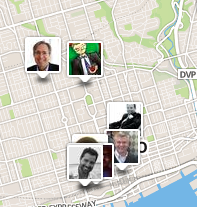Last winter, I developed a case of Foursquare fatigue.
It’s not because I lost the Mayorship of the Annex, where I live. (I have to say for a few months, it was a tightly contested race.)
And it’s not even because the whole concept of Mayor in Toronto has been tainted of late.
I’d simply grown tired of the game of checking in everywhere I go and not getting much value in return.
I used to hold the venerable title of Mayor at numerous restaurants and small shops in my neighbourhood. And a review of my checkins was like a map of my anthropological footprint (i.e. you knew where I hung out).
But none of the locations knew I was Mayor – or, for that matter, could care less. They were small businesses and worried about the little things, like making money and customer service.
I still like the idea of location as a way to bridge the mobile-retail gap and see lots of potential there. But rather than creating a separate network, we need to figure out a way for businesses to be online where their customers are and offer a seamless experience.
Facebook has the mass right now and is worth watching because of the job they’re doing with Facebook places and graph search. The question to as is can they get away from their big brand focus and appeal to Mom and Pop shops in a way that builds awareness and drives revenue for those small, quirky, personality-driven businesses? That is, putting a focus on hyper-local sales.
The new Yellow Pages
No one has figured out how to do what the Yellow Pages did so well for so many years. As Jay Baer might say, they were the ultimate youtility to help people find and connect with businesses in their community. When I started my first agency, I was too late to get into one edition and lamented that it would take almost a year for people to discover me there.
Retail was always about location. It still is – whether it’s the location online (name/URL), bricks and mortar or a combination of the two.
Combining the desire we have to shop, socialize and go out with mobile, augmented reality, recommendations and reviews, relevant promoted content – there’s incredible potential for the proverbial killer app.
Only this time, let’s keep civic politics out of it…
Where do you think location is heading?


Digital_DRK Thanks Darryl. Interesting that the initiative centres on ads, not gamification. Maybe the company needs to shift its focus and ask people what they think is working and then build on that.
Not directly relevant to Martin’s post, however an interesting side bar that Foursquare is indicating that some business’s are benefiting from advertising through them.
(Sorry for the lengthy URL, – at least you know where its from)
http://foursquare.tumblr.com/post/67581869554/how-one-bookstore-used-foursquare-ads-to-drive-sales
theelusivefish Thanks Rob. As I mentioned, a lot of people have been saying that they find Foursquare helpful when traveling and that makes sense. So I am going to re-look into that.
I also like how you use it as a signal to your team. All of these are more innovative uses than the check-in/mayor functionality that the app started with.
Maybe they should rethink the badge and focus on utility (or youtility…).
Lisa Gerber Thanks Lisa. I agree – it’s about the value we get and right now, the work to value ratio leans a bit too heavily on work.
I’ve heard from a couple of people that they use it when they’re traveling, for recommendations, etc. and it gives them what they’re looking for. So that’s good. Maybe it should reposition itself as a travel app – but then they might miss local recommendations.
Hi back!
Hey look… that’s me checked in to work in the image there.
I use 4sq as a way of telegraphing to friends and family that I’ve arrived safe when travelling, as a heads up to my team that I may not be at my desk and booted up but I’m in the building or conversely that I’m off and away for the night. I’ve never really been too much into the badge and game aspect of the tool but it’s sometimes revelatory in the number of times I frequent a place or the length of time between visits.
It becomes especially useful as a means of exploration and recommendation when you’re in a city with strong use of the app. My last trip to NYC was helped immensely by the tips of many a stranger and check-ins from friends before me.
I stopped using Foursquare locally for the same reasons. It was getting boring. However, it DOES come in handy for finding the best restaurant/bar, etc in airports, for example, and I do check in when I’m traveling because it’s fun to look back at the places I’ve been.
Unless we get value in checking in – and I don’t mean a discount all the time – why bother? Sometimes the value is finding a new place. Sometimes it is being able to reminisce. If it becomes a place where retailers have to offer price incentives to get business, that doesn’t sound sustainable to (makes me feel like Groupon) – it has to use other ways to add value. 🙂
HI! 🙂